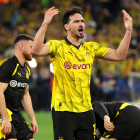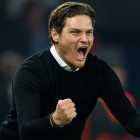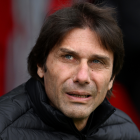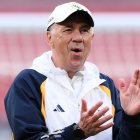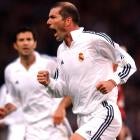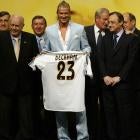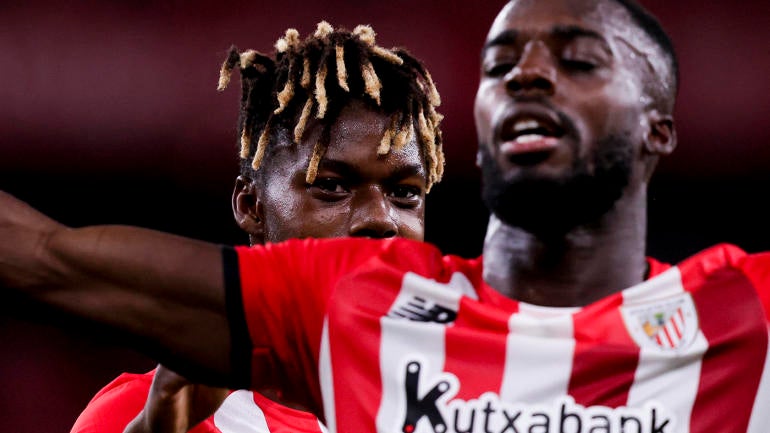
Brothers are an intriguing concept to me.
I don't have a brother. I was raised in a house of sisters, of strong women, so the female presence was as constant as it was powerful. But brothers? It's an undiscovered relationship, but it's one I imagine that gives a boy the first impressions of friendship and mentorship. All in one person.
In soccer, we have seen many brothers reach the highest of peaks. Jack and Bobby Charlton, for example, lifted the World Cup together, the De Boer twins played alongside each other for almost their entire career, while the Laudrups created immense history. Michael is known as Denmark's greatest ever player while Brian guided the nation to a historic European Championship title in 1992.
There are many stories like this -- of failure and success -- shared among siblings, but Iñaki and Nico Williams from Athletic Bilbao -- born and raised in the Basque country from Ghanaian immigrants -- are quite the inspiring story and one worth telling again and again.
Any fan in La Liga should already be familiar with the eldest, 28-year-old Iñaki Williams -- the team's star striker. He has been part of the club since he was 18, making his debut two years later in 2014 ... and he's never looked back. On Friday, when Athletic host Getafe and continue to fight for a European place in the table, he will play his 225th consecutive match. An almost-impossible-to-believe Iron Man record in Spain. How in the world is this possible?
"I have to keep touching wood because I don't really do anything out of the ordinary," he said, sitting next to his brother, in an interview with CBS Sports podcast ¡Qué Golazo!. "I take care of myself at just the right amount and I enjoy myself to the maximum amount. I have good genetics, I guess, and the fortune of never suffering a serious injury."
It's not only fortune, of course, as Williams knows that in order for an engine to continue, it must take care of itself.
"When I was younger, I didn't need to do much exercise outside of training, but once you get older, rehabbing is not as easy as when you were 20 or 21 years old -- like my brother here. So I know I take care of myself more. I watch more of what I eat ... Marcelino [García Toral's] arrival has made us more prepared, more disciplined. So I am in great condition, so I hope to keep playing more games because that's what I love the most -- to play every Sunday and help the team."
As Williams talks, his younger brother Nico watches and listens with loving intensity. I ask him if he could ever dream of emulating what Iñaki has done. "It wouldn't be bad, to be honest," he said, smiling. "It would be fantastic to reach those numbers but I think it's going to cost me. My brother takes care of himself, he's an example for me."
This is how Nico, at 19 years old, sees his brother. As a friend, as a mentor and as a third parent. In return, Iñaki doesn't take this for granted. He values this precious connection because only they know what they have gone through, and most importantly, what their parents sacrificed in order to be here.
"Thanks to my parents, we have never needed anything. Warm meals, a good education, but we've never had a luxurious life -- we have always depended on day to day," says Iñaki.
"Everything my parents have done for me and Nico, what we can give back will never amount. But we try to say thanks on the pitch so they can feel proud, seeing us achieve our dreams -- and we're only here because of them. They taught us the value of hard work, education and that no one in life gives you anything so we're here because of their sacrifices."
The story may be familiar to you. If it isn't, it's worth knowing.
Their parents, searching for a better life, crossed the Sahara desert from Ghana without much food or water -- their mother pregnant with Iñaki -- until reaching the Spanish enclave of Melilla in the northern part of Morocco. It was then when they met an attorney and were advised to seek political asylum, escaping the Liberian Civil War. Eventually, they arrived in Bilbao.
"My friends and I talk about it," Iñaki told Sid Lowe via The Guardian last year. "Bloody hell, incredible. Everything happens for a reason. If I hadn't been born in Bilbao, I could never have played for Athletic. My parents crossed the desert and were taken to the Basque country. That doesn't feel like chance."
Throughout their upbringing in Pamplona, as his father looked for work in England, Iñaki had to help his mother with Nico.
"He was like a father to me because my dad had to go to England," Nico recalled. "My brother would take me and pick me up from school, a lot of things fathers do. So I am very thankful for my brother, the kind person that he is ..."
Nico patted Iñaki on the back, showing him the kind of smile only meant for someone that truly deserves it.
This type of bond now translates on the pitch. When Nico made his debut for the senior team last season in a 2-2 result against Valladolid, he wore Iñaki's No. 30. It was an amazing moment for the family, one that almost overwhelmed the younger brother.
"The truth is I was very nervous when I debuted with the first team," Nico reflected. "When the ball first came to me, I kinda stumbled, but my brother calmed me down a lot. He told me to relax, to just focus on playing how you have always played, and in the end, everything came out well. It was an honor for my brother and my parents to watch me, see me grow and be able to play with my brother -- hopefully for many more years."
Iñaki's parental-big-brother instincts haven't left him. On the pitch, if both are playing, his focus splits.
"When we're on the pitch, I find myself checking on him, wanting to make sure he is playing well, as opposed to me. In the end, that feeling of taking care of him and having him as my younger brother, for him to succeed and reach his goals -- to me, that gives me so much pride."
It's not to say they aren't competitive against each other. When asked who wins in "FIFA," Nico proudly raises his hand.
"You know what happens," Iñaki complained. "The problem is that I grew up with 'Pro Evolution' ... so these kids start with 'FIFA' when they're super young, well, they eat us for breakfast."
Nico laughed.
I asked Iñaki what's the worst thing about having your brother on the same team?
"He's the reason I get benched."
They laughed.
There's another part to this story that's important to remember. Iñaki and Nico Williams are not only brothers on the pitch or sons of immigrants with an inspiring tale. They are also an example of what the future can represent for the club and Spain. Their very presence influences the way black and brown kids see Athletic -- who only recruit Basque-born talent -- and dream of one day wearing the team's shirt or even playing for the national team. In a country and culture that continues to work on improving the need for multiculturalism and representation, the Williams story is also a lesson. As a club, Athletic are well aware of this. It's why they continuously emphasize the need to make sure they are not just an inspiring story -- but a normality.
"When I was younger, I would have liked to have seen an idol -- that looked like me -- at Athletic," said Iñaki. "Now, to many, we are very conscious that we are an example -- not just to kids, but to adults -- who thought there would never be a black player at Athletic. Now there are two. I think we have opened the minds of many people. There's still a long way to go for the club, but one day we will hopefully see not just us, but many more -- and that's what we are seeing in the 21st century. More diversity and social inclusion ... and that it doesn't matter where you come from but where you are born, along with where you are raised and your values -- that's in the end -- what makes you play for Athletic."
Bilbao is their home and they love their community. They will never forget their Ghanaian roots but Basque country is all they have known. Their aim is to always show pride in representing all aspects of their upbringing and doing everything they can to honor their parents and what they did in order for them to have a prosperous life, but they also want to celebrate their town and the only life they have ever known.
"All of us who are born in Bilbao, Basque country, dream of one day playing for Athletic and be able to defend the badge, so that deep-rooted feeling we have is the difference between us and other clubs," said Iñaki as Nico nodded in agreement.
I tell them that my wife and I are heading there next month as I'll be tracing the roots of my last name (Echegaray is from San Sebastian), eat some good food and hopefully watch them play.
"You're going to love our culture and our traditions," Iñaki said. "They might say those from the north are unsocial. On the contrary, we help other people and most of all ... The food? You're going to love it. A good Chuleton. You can't miss that. That goes with a good glass of wine because that's how you eat and live well."
Iñaki and Nico Williams represent the present and future of a community that evolves thanks to a hopeful welcoming of multiculturalism that also maintains a sense of Basque pride. What hopefully happens next is that their magnificent story becomes one of many.














